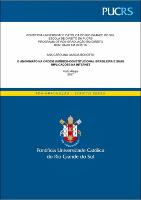| Share record |


|
Please use this identifier to cite or link to this item:
https://tede2.pucrs.br/tede2/handle/tede/9094| Document type: | Dissertação |
| Title: | O anonimato na ordem jurídico-constitucional brasileira e suas implicações na internet |
| Author: | Bonotto, Ana Carolina Garcia  |
| Advisor: | Sarlet, Ingo Wolfgang |
| Abstract (native): | O presente trabalho analisa o âmbito de proteção da liberdade de expressão a fim de verificar a possibilidade de uma releitura da vedação do anonimato na Constituição Brasileira frente as novas Tecnologias de Informação e Comunicação – TIC. Para isso, analisa a possibilidade de direito ao anonimato a partir da preservação do direito à privacidade, e enquanto forma de preservação da liberdade de expressão. A liberdade de expressão e de informação se constitui por um ordenamento jurídico consolidado, resultado de lutas e conquistas históricas, e que atualmente as normatividades nacionais e internacionais enfatizam. Ademais, demonstram o alcance da conquista democrática de muitos países através da mobilização e da voz do povo. A liberdade de expressão, no Brasil, é um direito fundamental expresso pela Constituição Federal. Este direito, contudo, vem limitado a atos que não ocultem a identidade do indivíduo no seu exercício. São poucos os Julgamentos do Supremo Tribunal Federal que tratam desta cláusula limitativa e, aqueles que a referem, dividem-se em opiniões quanto à aplicação do instituto. Este contexto, somado aos novos desafios de uma sociedade pós moderna conectada por redes e com novos meios de comunicação, faz-se exaltar a necessidade de novos contornos a este direito constitucional e ao próprio instituto do anonimato. Enquanto no contexto off-line as barreiras da comunicação e difusão de informação se mostravam mais robustas, no contexto on-line estas barreiras parecem, em grande parte, terem sido rompidas e necessitarem, com urgência de um enfretamento temático com efeito vinculante. Neste sentido, a realidade do anonimato on-line surge clamando ser esmiuçada relacionando-se a preservação de informações pessoais. A sociedade ainda se mostra desconhecedora do manuseio, possibilidades e riscos de uso da rede, acarretando, por vezes, dificuldades processuais para a perseguição das infrações e delitos cometidos pela rede. Em específico, no uso da Internet, o usuário pode ser identificado através do cruzamento de dados e identificação de IP (Protocolo da Internet), e dificilmente se consegue ser anônimo, por isso fala-se em anonimato relativo. A partir de Diretivas Internacionais e o próprio Marco civil da Internet, nota-se a preservação de informações pessoais abrindo uma nova relação do instituto do anonimato com os bens jurídicos protegidos pela Constituição brasileira. |
| Abstract (english): | The present study analyzes the scope of protection of freedom of speech in order to verify the possibility of a rereading of the veto to anonymity in the Brazilian Constitution regarding the news Technologies of Information and Communication - ICT. To this end, it analyzes the possibility of anonymity based on the preservation of the right to privacy, and as a means of preserving freedom of speech. Freedom of speech and information is constituted by a consolidated legal system, the result of historical struggles and achievements, and currently emphasized by national and international regulations. In addition, they demonstrate the reach of the democratic conquest of many countries through the mobilization and voice of the people. Freedom of speech in Brazil is a fundamental right expressed by the Federal Constitution. This right, however, is limited to acts that do not hide the identity of the individual in his or her exercise. There are few Supreme Court Judgments dealing with this limitation clause, and those who refer it, are divided in opinions regarding the application of the institute. This context, add up with the new challenges of a postmodern society connected by networks and new media, exalts the need for new contours to this constitutional guarantee and to the institute of anonymity itself. While in the offline context the barriers off communication and information diffusion showed more robust, in the online context these barriers seem to have been largely broken and urgently require a thematic engagement with binding effect. In this sense, the reality of online anonymity arises clamoring to be scrutiny relating to the preservation of personal information. The society is still unaware of the handling, possibilities and risks of using the network, sometimes leading to procedural difficulties for the prosecution of infractions and crimes committed by the network. In specific, in the use of the Internet, the user can be identified through the crossing of data and identification of the IP (Internet Protocol), and difficultly can be anonymous, so it is spoken in relative anonymity. Based on International Directives and the Civil Internet Framework itself, can be observed the preservation of personal information by opening a new relationship between the institute of anonymity and the legal assets protected by the Brazilian Constitution. |
| Keywords: | Anonimato Liberdade de Expressão Internet Comunicação em Rede Tecnologias da Informação e Comunicação Anonymity Freedom of Speech Internet Network Communication Information and Communication Technologies |
| CNPQ Knowledge Areas: | CIENCIAS SOCIAIS APLICADAS::DIREITO |
| Language: | por |
| Country: | Brasil |
| Publisher: | Pontifícia Universidade Católica do Rio Grande do Sul |
| Institution Acronym: | PUCRS |
| Department: | Escola de Direito |
| Program: | Programa de Pós-Graduação em Direito |
| Access type: | Acesso Aberto |
| Fulltext access restriction: | Trabalho não apresenta restrição para publicação |
| URI: | http://tede2.pucrs.br/tede2/handle/tede/9094 |
| Issue Date: | 27-Dec-2017 |
| Appears in Collections: | Programa de Pós-Graduação em Direito |
Files in This Item:
| File | Description | Size | Format | |
|---|---|---|---|---|
| Ana_Cristina_Bonotto.pdf | ANA_CAROLINA_GARCIA_BONOTTO_DIS | 945.98 kB | Adobe PDF |  Download/Open Preview |
Items in DSpace are protected by copyright, with all rights reserved, unless otherwise indicated.




